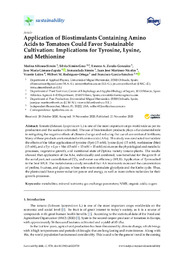Título :
Application of Biostimulants Containing Amino Acids to Tomatoes Could Favor Sustainable Cultivation: Implications for Tyrosine, Lysine, and Methionine |
Autor :
Cámara-Zapata, José-María 
Alfosea Simón, Marina 
Simon Grao, Silvia 
Zavala González, Ernesto
Simón Vilella, Inmaculada 
Martinez Nicolas, Juan Jose 
Lidón Noguera, Vicente 
Rodríguez Ortega, Wilbert Michael
García Sánchez, Francisco |
Editor :
MDPI |
Departamento:
Departamentos de la UMH::Física Aplicada |
Fecha de publicación:
2020-11 |
URI :
https://hdl.handle.net/11000/33490 |
Resumen :
Tomato (Solanum lycopersicum L.) is one of the most important crops worldwide as per its
production and the surface cultivated. The use of biostimulant products plays a fundamental role
in mitigating the negative effects of climate change and reducing the use of conventional fertilizers.
Many of these products are formulated with amino acids (AAs). This study was conducted to elucidate
the effects of the foliar application of tyrosine (Tyr) (15 mM), lysine (Lys) (15 mM), methionine (Met)
(15 mM), and a Tyr + Lys + Met (15 mM + 15 mM + 15 mM) mixture on the physiological and metabolic
processes, vegetative growth, and nutritional state of Optima variety tomato plants. The results
showed that application of the AAs, individually and combined, was beneficial for the growth of
the aerial part, net assimilation of CO2, and water use efficiency (WUE). Application of Tyr resulted
in the best WUE. The metabolomics study revealed that AA treatments increased the concentration
of proline, fructose, and glucose, whose role was to stimulate glycolysis and the Krebs cycle. Thus,
the plants could have greater reduction power and energy, as well as more carbon molecules for their
growth processes.
|
Palabras clave/Materias:
Metabolites
Mineral nutrients
Gas exchange parameters
NMR
Organic acids
Sugars |
Tipo de documento :
info:eu-repo/semantics/article |
Derechos de acceso:
info:eu-repo/semantics/openAccess
Attribution-NonCommercial-NoDerivatives 4.0 Internacional |
DOI :
https://doi.org/10.3390/su12229729 |
Publicado en:
Sustainability 2020, 12 |
Aparece en las colecciones:
Artículos - Física Aplicada
|
 La licencia se describe como: Atribución-NonComercial-NoDerivada 4.0 Internacional.
La licencia se describe como: Atribución-NonComercial-NoDerivada 4.0 Internacional.
.png)
